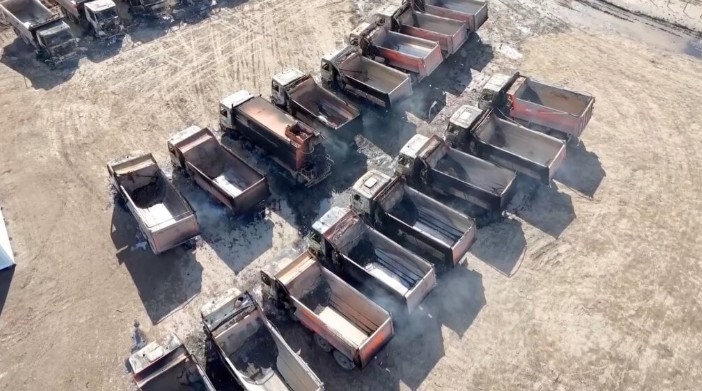The forestry sector in the Biobío region strongly responded to the statements by the Regional Ministerial Secretary (Seremi) of Public Security, Paulina Stuardo, who claimed that attacks on trails have decreased in the territory.
The Chilean Wood Corporation (Corma) and the Association of Forestry Contractors (Acoforag) warned that the actual situation on the ground is different and that the scenario remains highly dangerous.
René Muñoz, manager of Acoforag, detailed that Biobío province has seen a 100% increase in attacks compared to last year. Although the figure may seem relative—since in 2024 there were no attacks against contractors—it reflects a return of violence, particularly the attack that left 7 pieces of equipment destroyed in Mulchén.
In that context, he stated that since 2014, they have had no peace or tranquility to work in the southern macro-zone, neither on public nor private roads. "That feeling is permanent. In fact, we have five forestry workers murdered, 521 attacks, and 1,850 pieces of equipment destroyed. So, with that panorama of destruction, the truth is that tranquility in the forestry sector does not exist. We don't maintain permanence; we remain in a state of tense calm, waiting for the moment when we will be attacked, beaten, and some kidnapped. It is not a condition that allows for work," Muñoz recounted.
The Biobío Seremi of Public Security attributed the decrease in the number of recorded attacks to coordinated work among the police, prosecutors, and related agencies.
Regarding this, Muñoz indicated that inter-institutional coordination should be the minimum standard. "We continue to maintain that more progress is needed," he expressed.
In that context, he detailed that out of the 173 attacks recorded in the Biobío region, only one has resulted in guilty parties processed and convicted in Cañete.
Intelligence, Resources, and Results
Muñoz argued that one of the most serious issues in confronting rural violence is the lack of operational intelligence. In this regard, he emphasized that there is no real capacity to anticipate attacks. In the leader's opinion, legislative stagnation also contributes to the lack of concrete results in criminal prosecution. Therefore, he insisted that "the intelligence law in Congress must advance more quickly to equip the police and prosecutors with the necessary means."
Muñoz also questioned the statement by the Seremi of Public Security, who indicated that some recent attacks had been committed without firearms. For the Acoforag representative, this assertion does not align with the reality on the ground. "The theory of attacks without weapons seems a bit dubious to me. This group is not going to go around unarmed, exposing themselves to extreme risk and danger," he added.
Complete Picture
"When we talk about security, from Corma we believe it is essential to look at the complete picture and, realistically, violence remains present in Biobío. From our perspective, the authority presented a partial assessment that does not reflect the complexity of the current scenario," stated the president of Corma in Biobío Ñuble, Alejandro Casagrande.
Unresolved Issue
According to the union leader, in recent weeks, attacks have not decreased significantly and, on the contrary, have shown a concerning intensification that requires a macro-regional and not fragmented view.
"Particularly in Biobío province, we cannot forget that the Rucalhue attack was one of the largest in history, where the attackers entered armed, intimidated workers, and destroyed about 45 trucks and 5 heavy machinery," expressed the Corma representative.
Similarly, he assured that what is happening in Arauco province cannot be normalized either, where, he stated, there are practically no forestry operations left. "Every attempt to work ends with burned machinery, threats, and risks to people. Although we value the recent arrest of two individuals allegedly involved in the Contulmo attack, these advances do not change the fact that violence continues to affect communities and paralyze the economic development of the area," he added.
Nevertheless, Casagrande considered it relevant to highlight the coordination work driven by the National Defense Headquarters (Jedena), which has allowed for strengthening intelligence and prevention and improving the response to incidents.
He also emphasized the work carried out by Acoforag, who represent the victims of incendiary attacks with 1,838 machines and forestry trucks destroyed.
"Their work of collecting and systematizing information has become a key tool to understand the evolution of attacks in the sector and accurately measure their real impact," highlighted the president of Corma Biobío and Ñuble.
"What we need now is to decisively advance in dismantling the gangs operating in the region because as long as these groups continue to act with coordination, resources, and damaging capacity, no effort will be sufficient to guarantee security. Experience shows that containing the events is not enough; it is essential to strike the structures that organize and execute these attacks," Casagrande pointed out.
Source:La Tribuna







Comentarios (0)
No hay comentarios aún. ¡Sé el primero en comentar!
Deja un comentario